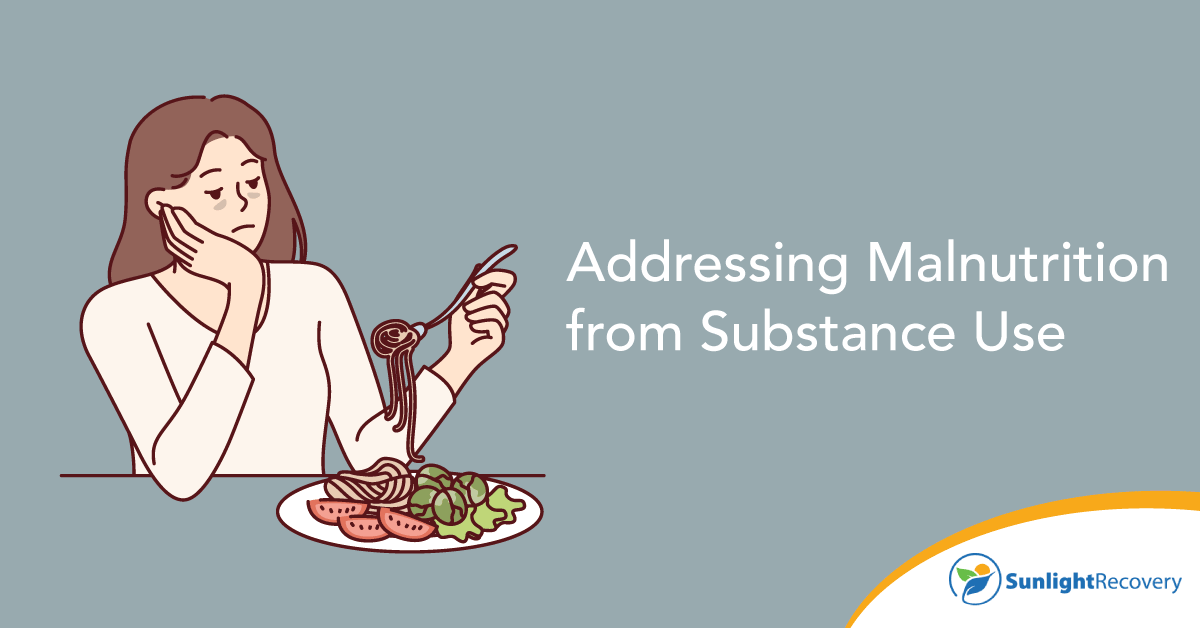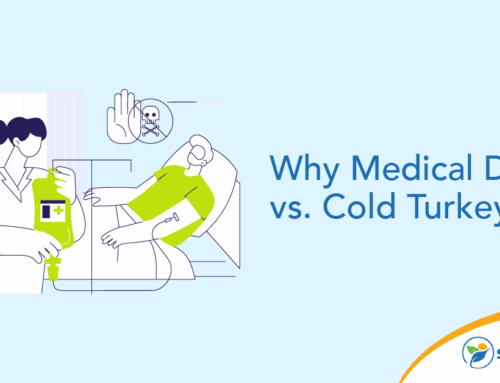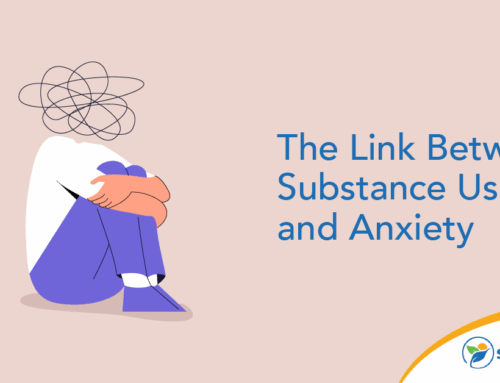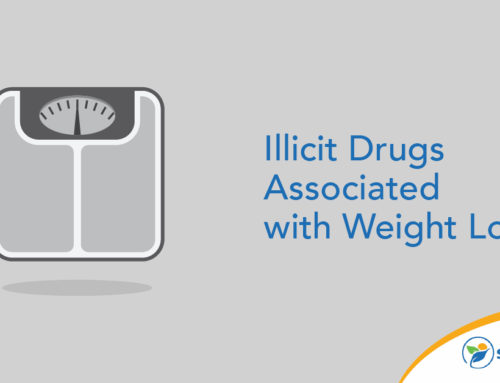When we think of malnutrition, our minds immediately jump to diet. While a poor diet can contribute to malnutrition, this condition is also associated with substance use. Alcohol and drugs prevent the body from absorbing nutrients, vitamins and electrolytes, all of which are essential for health and well-being.
In this article, we’ll take a closer look at malnutrition in substance users, including how it manifests and its symptoms. We’ll also review steps to restore nutrients and regain control of your health.
Understanding Malnutrition and Its Link to Substance Use
Before reviewing the link between substance use and nutrition, it’s important to understand what this condition is. Put simply, malnutrition occurs when the body doesn’t receive the nutrients it needs to function properly. There are two main types: undernutrition and overnutrition. Undernutrition is associated with calorie deficiency, as well as decreased vitamins and minerals. Overnutrition, on the other hand, involves a combination of excessive calorie intake and low nutritional levels. Both undernutrition and overnutrition deplete vital nutrients your body needs to operate, making them dangerous conditions.
So how exactly does substance use lead to malnutrition? While every substance affects the body differently, many impair nutrient absorption through the following means:
- Appetite suppression. Certain substances, such as stimulants like cocaine, suppress appetite. As a result, the user may skip meals and not consume enough food, resulting in nutritional and electrolyte deficiencies.
- Nutrient depletion. Many substances actively deplete essential nutrients, vitamins and minerals. For example, alcohol prevents the body from absorbing vitamin B, which plays a key role in brain health and the nervous system.
- Digestive system damage. Chronic drug and alcohol use can seriously damage the gastrointestinal tract. Excessive alcohol use, for example, irritates the stomach lining, which slows digestion, impairs nutrient absorption and causes inflammation. Opioids, meanwhile, may slow down the digestive system, which decreases nutrient absorption and causes an imbalance of sodium, potassium and chloride.
One of the most common nutritional deficiencies in substance users is thiamine, or vitamin B1, deficiency. Studies show that up to 80% of people with alcohol use disorder have lower levels of thiamine. Many substance users also have an imbalance of electrolytes, which are key minerals that help regulate nerve and muscle function. Over time, malnutrition significantly weakens the body, resulting in serious physical and mental symptoms.
Signs of Malnutrition in Substance Users
Nutrients are essential for many bodily functions, including energy production, muscle growth, immune system support and brain health. So, if you’re not getting enough nutrients, your physical and mental health will suffer. More specifically, you may experience the following symptoms:
- Fatigue. Decreased levels of vitamin B and minerals can lower your energy levels, causing consistent fatigue and making it difficult to complete daily tasks.
- Hair and skin problems. Vitamin deficiencies can cause cosmetic problems, including dry, flaky skin and brittle, thinning hair.
- Cardiovascular issues. Electrolytes, such as potassium and magnesium, play an important role in heart health. If your body isn’t absorbing these substances, you may experience an irregular heartbeat, palpitations and an increased risk of heart disease.
- Weakened immune system. Vitamin and nutrient deficiencies weaken your immune system, increasing the likelihood and frequency of infections.
- Mental confusion. As mentioned above, vitamin B is important for brain health. Decreased levels are linked to many cognitive issues, including memory loss, confusion and poor concentration.
- Mood and personality changes. In addition to poor brain function, nutritional deficiencies can affect personality and mood. Symptoms include increased irritability, mood swings, depression and anxiety.
Over time, malnutrition can worsen substance use by weakening the body and making it more susceptible to the effects of alcohol and drugs. It may also exacerbate cravings for substances and impair judgment. Meanwhile, substance use encourages further malnutrition, resulting in a vicious cycle. While it’s not always easy to break this cycle, there are ways to restore nutritional health and conquer substance use.
How to Restore Nutritional Health
By lowering physical and cognitive function, poor nutrition makes it more difficult to overcome addiction. Addressing nutritional deficiencies helps improve overall well-being, which supports long-term recovery. Here are some tips for restoring nutritional health:
- Maintain a balanced diet. A balanced diet that includes nutrient-dense foods may replenish deficiencies. In general, your diet should include fruits and vegetables, lean proteins, whole grains and healthy fats (such as omega-3 fatty acids).
- Stay hydrated. Dehydration, which is a common side effect of alcohol and substance use, can cause vitamin deficiencies through vomiting and diarrhea. To prevent dehydration, drink at least eight cups of water per day. You can also replenish electrolytes by drinking sports beverages.
- Exercise regularly. Physical exercise and proper nutrition go hand in hand. Exercise improves metabolism, helping ensure your body is receiving nutrients and energy. It’s recommended that adults get at least 150 minutes of moderate activity or 75 minutes of vigorous activity each week.
- Take nutritional supplements. Sometimes, dietary changes aren’t enough to fix nutritional deficiencies. In these cases, it may help to take supplements for missing vitamins and minerals. Always consult a health care professional before taking supplements.
- Make a diet plan. It’s one thing to incorporate healthy foods into your diet; it’s another to stick to this routine consistently. To help ensure long-term results, consider making a dietary plan. This involves determining what your nutrient intake should be and consuming meals that provide those nutrients. Nutritionists can provide guidance and help you create and stick to a plan.
While these changes go a long way toward improving nutrition, it can be difficult to implement them — especially if you’re struggling with substance use. Not to mention, addressing nutritional deficiencies generally isn’t enough to overcome addiction. That’s why it’s important to pair these strategies with professional substance use treatment.
Finding Support for Malnutrition and Substance Use
There’s no question that proper nutrition is essential to your health. Maintaining your nutrients and vitamins doesn’t just support your body; it also improves mental health and helps you overcome substance use.
If you or a loved one is struggling with malnutrition and substance use, help is available. At Sunlight Recovery, we offer personalized mental health treatments that address the negative effects of substance use. These include nutritional support for alcohol recovery, supervised detoxification sessions and counseling and therapy. Contact us today to learn more about our programs.







